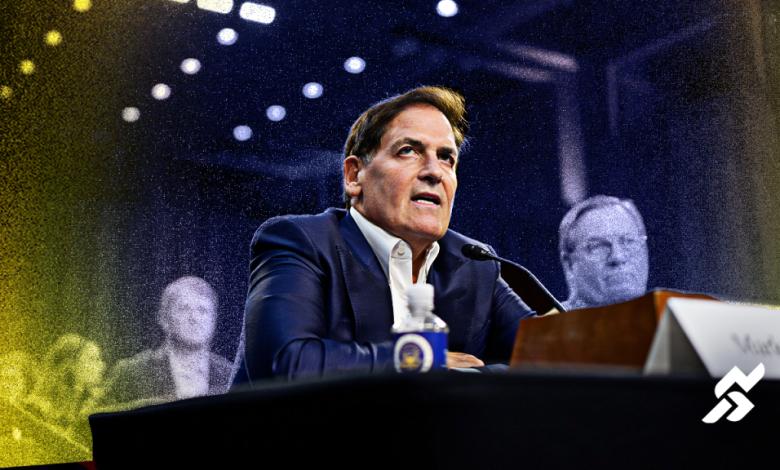Mark Cuban Joins Legal Fight Against Dark Money and Super PACs

Dallas Mavericks minority owner Mark Cuban has teamed up with four other billionaires—hedge fund manager William von Mueffling, LinkedIn co-founder Reid Hoffman, and venture capitalists Steve Jurvetson and Vin Ryan—to argue in an amicus brief that their enormous wealth shouldn’t provide them more political influence than other Americans and that a Maine campaign finance law limiting contributions to super political action committees (super PACs) is both sensible and constitutional.
“Because of their wealth,” the brief says of the billionaires, “amici have the capacity to be extraordinarily influential in America’s political system. But amici didn’t ask for this power. And they don’t want it.”
The brief concerns Dinner Table Action & For Our Future v. William J. Schneider et al., a case brought by two Maine super PACs that accept contributions exceeding Maine’s limit. Several Maine officials, including Maine Commission on Governmental Ethics and Election Practices chairman William J. Schneider, are the defendants.
The case centers on whether a citizen referendum, overwhelmingly approved by Maine voters last year, complies with First Amendment political speech protections. The resulting act sets a $5,000 limit for super PACs. It also includes disclosure requirements regarding the identity of donors and donations related to funding communications that advocate for the election or defeat of a particular candidate. The referendum was backed by Equal Citizens and its founder, Harvard Law School professor Lawrence Lessig.
Under federal law, super PACs are permitted to accept unlimited contributions, whereas PACs are subject to donation limits. Super PACs use these funds for “independent expenditures”—spending that advocates for or against a political candidate without coordinating with the candidate or their opponent. In contrast, PACs can give money directly to candidates’ campaigns.
The U.S. Court of Appeals for the First Circuit is weighing an appeal of U.S. Magistrate Judge Karen Frink Wolf’s July ruling in favor of Dinner Table Action and For Our Future. Frink Wolf deemed Maine’s law “unconstitutional on its face” because—she contends—it violates the First Amendment.
The judge cited the U.S. Supreme Court’s controversial ruling in Citizens United v. FEC (2010) to assert that restrictions on independent political expenditures made without “quid pro quo” candidate coordination are problematic because those payments allegedly lack the appearance of a bribe or payoff. Frink Wolf also maintained that “independent expenditures” are “sufficiently removed from the candidate” and thus “the danger of such corruption” is outweighed by First Amendment protections.
Cuban, who sold a majority stake in the Mavericks in late 2023 to the Adelson family, has been talked about as a potential candidate for office, including the presidency. He has denied interest in running, though he played an active role as a surrogate for then-Vice President Kamala Harris in her 2024 presidential campaign. More recently, Cuban—who is co-founder of affordable generic drugs company Cost Plus Drugs—testified at the U.S. Senate on lowering prescription drug costs.
Cuban’s support of restricting super PACs comes at a time when many team owners contribute sizable sums of money to political causes in hopes of influencing governmental and policy outcomes. Denver Broncos co-owner Rob Walton, for example, reportedly donated millions of dollars to at least four super PACs in the 2024 election cycle. Other major donors to super PACs include New York Jets owner Woody Johnson and Atlanta Falcons owner Arthur Blank. Miriam Adelson, whose family now owns a majority of the Mavericks, reportedly donated $100 million to a super PAC, Preserve America, which supported President Donald Trump’s candidacy in 2024.
In the appeal, Maine officials reject Frink Wolf’s reasoning and seek a reversal. They warn the “potential for quid pro quo corruption” involving super PAC contributions “is obvious.” The officials also cite the ability of “wealthy donors,” including those whose businesses are before the government, “to funnel unlimited sums to entities dedicated to the support of a particular candidate.” This dynamic “creates a direct opportunity for bribery.”
Enter the five billionaires.
Last Thursday, professors Samuel Jacob Davis and Ruth Greenwood of the Election Law Clinic at Harvard Law School submitted an amicus brief on behalf of Cuban and his colleagues. (For transparency, I am a visiting professor of law at Harvard Law School but am not involved with the Election Law Clinic.)
Cuban’s group sees Maine’s law as “reasonable” and “necessary to protect” democracy from “the kind of corruption that plagues too many elections.” That is especially important in a sparsely populated state like Maine, where “a relatively small amount of outside money can play an outsized role in local races that should be focused on local issues.”
The brief contends that regulating super PAC contributions imposes minimal constraints on free speech rights. It asserts that super PACs “give voters little useful information and often express a muddled political message,” with donations “often funneled through shell entities” known as “dark money organizations.”
Cuban’s group also stresses the problematic practice of “bet-hedging,” where super PACs contribute “similar amounts to opposing candidates in a single election” in hopes of currying favor with the eventual winner. Bet-hedging super PACs aren’t offering a coherent policy position for voters to weigh but instead trying to cover all bases in an election.
Further, the brief warns that unlimited super PAC contributions “create a serious risk of actual quid pro quo corruption and its appearance.” It cites former U.S. Senator—and now convicted felon—Bob Menendez (D-N.J.), who was accused of using super PAC contributions as payoffs for influencing a Medicare billing dispute involving a friend. The brief also points out that super PAC contributors have been appointed to high-ranking positions. For instance, current U.S. Secretary of Education Linda McMahon “had no teaching experience prior to her appointment, but she had donated tens of millions of dollars to various super PACs supporting the president who appointed her.”
The clinic is directed by Greenwood, with professor Nicholas Stephanopoulos and Davis also playing key roles. Harvard Law students actively participate in the clinic’s work, including drafting briefs.
Kaitlin Knocke, a second-year law student and member of the Clinic, worked on Cuban’s brief.
Knocke told Sportico that Cuban’s “involvement helped spotlight how reasonable campaign finance laws like Maine’s limit on super PAC contributions can serve the public interest by making American democracy more accountable, transparent and fair.”
The First Circuit’s review of the appeal will likely continue into 2026, right in time for the midterm elections.




